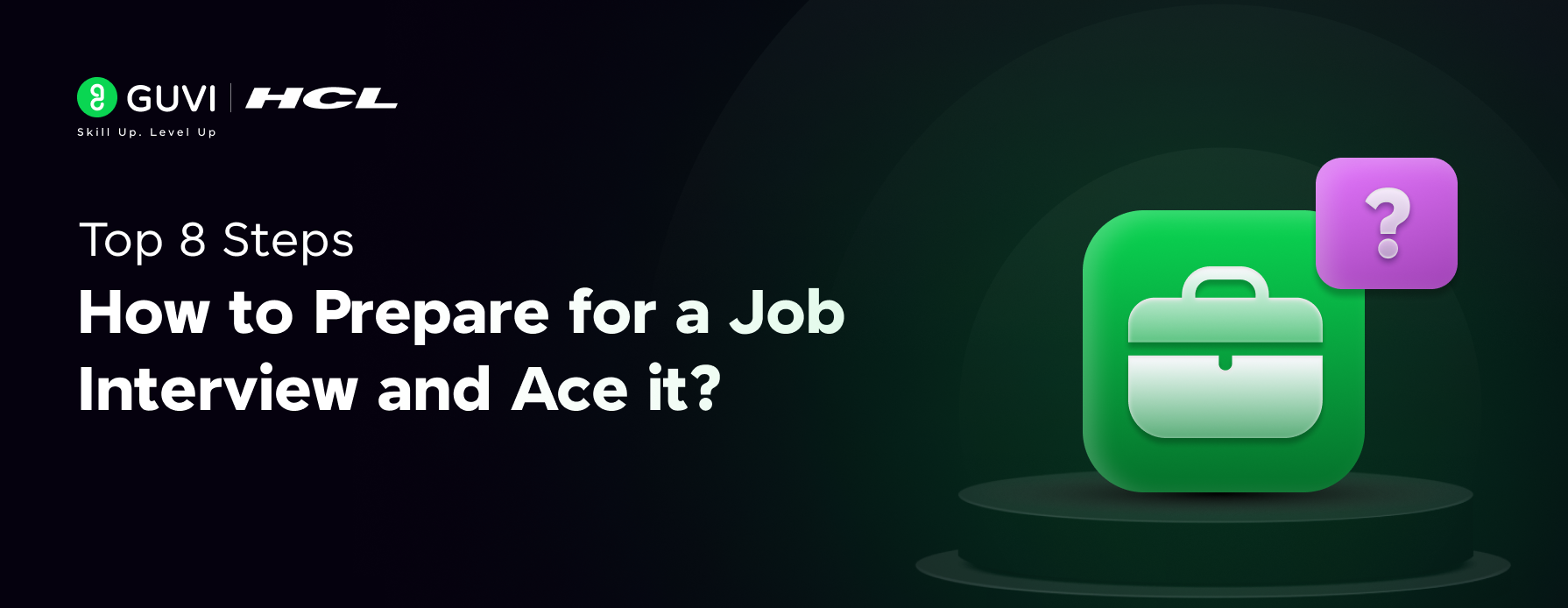
How to Prepare for a Job Interview and Ace it? Top 8 Steps
May 08, 2025 8 Min Read 5848 Views
(Last Updated)
Seven seconds. This tiny window is all interviewers need to form their first impression. And that’s why your interview preparation is more significant than ever. Companies now conduct three to eight interviews before making hiring decisions, especially the Tier-1 companies like Amazon and Google.
A detailed preparation plan is vital to succeed. Interview preparation needs multiple elements to work well. You need to become skilled at the STAR method for behavioral questions. Good body language helps you retain control of the conversation. Sounds a little confusing right?
Hence, in this article I will guide you through eight practical steps that will help you ace your next job interview. These tips work whether you’re facing your first job interview or want to improve your existing skills.
Table of contents
- Understanding the Job Interview Process
- How to prepare for a Job Interview: Step-by-Step
- 1) Research the Company & Job Role
- a) Analyze the company's background, culture, and mission
- b) Review recent company news, financial reports, and industry trends
- c) Understand the job description and match your skills with requirements
- 2) Perfect Your Resume & Portfolio
- a) Update your resume to match the job role
- b) Make your cover letter stand out with key achievements
- c) Build a portfolio that shows relevant work (for creative and technical roles)
- 3) Prepare for Common & Behavioural Questions
- a) Common questions
- b) Behavioral questions using the STAR method
- c) How to answer salary expectation and career growth-related questions
- 4) Dress for Success
- a) Choose attire based on company culture (formal vs. business casual)
- 5) Body Language & Communication Skills
- a) Importance of maintaining eye contact and a confident posture
- b) Tips on clear and concise communication
- c) Avoiding negative body language like fidgeting or crossing arms
- 6) Technical & Skill-Based Preparation
- a) Research role-specific technical questions
- b) Review past work experience and be ready to discuss it in detail
- c) Participate in mock interviews and practice coding, case studies, or problem-solving exercises
- 7) Questions to Ask the Interviewer
- a) Best questions to show curiosity and interest
- 8) Post-Interview Follow-Up
- a) Sending a thank-you email within 24 hours
- b) Following up on the hiring decision without being intrusive
- c) Getting better through self-reflection
- Concluding Thoughts…
- FAQs
- Q1. How can I make a great first impression in a job interview?
- Q2. What's the best way to prepare for common interview questions?
- Q3. How should I handle questions about salary expectations?
- Q4. What kind of questions should I ask the interviewer?
- Q5. How important is the post-interview follow-up?
Understanding the Job Interview Process
Job interviews today go beyond simple Q&A sessions with a well-laid-out approach. You can boost your success chances by understanding each stage of the process.
Companies now run multiple interview rounds that can stretch up to nine rounds.
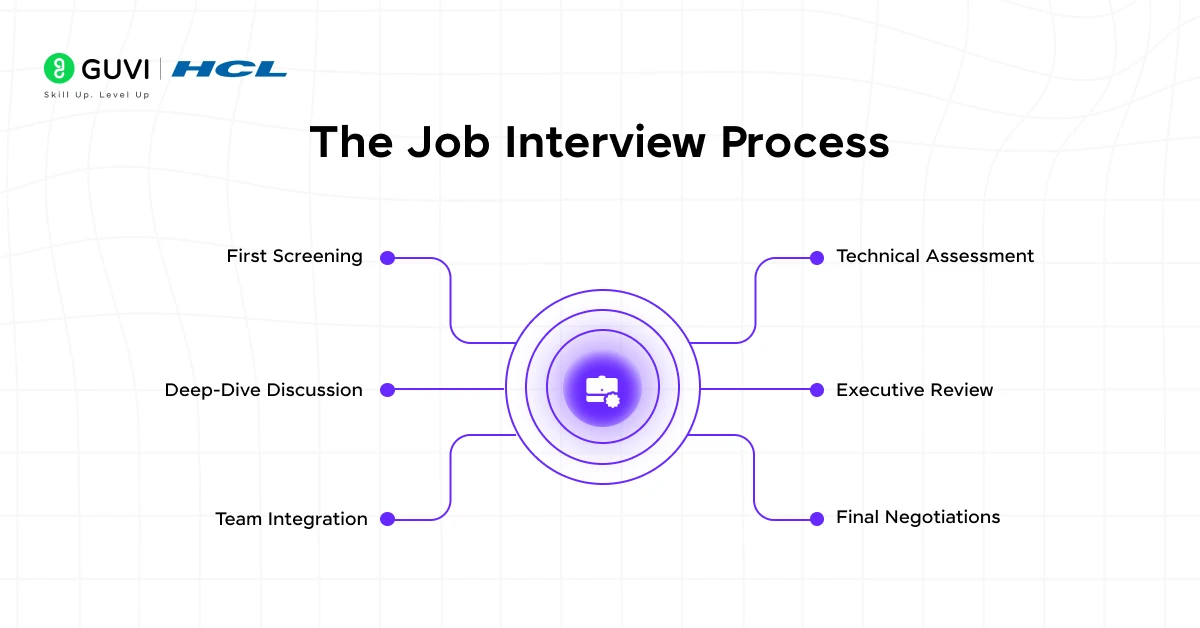
Each interview helps review your fit for the role. The process usually follows six stages:
- First Screening: Your first contact typically confirms your basic qualifications, salary expectations, and in-office requirements. Many companies use chatbots for this early review.
- Deep-Dive Discussion: You meet your potential direct supervisor next. This phase focuses on your competencies, problem-solving abilities, and communication style. The interviewer reviews your motivation through open-ended questions about your achievements.
- Team Integration: This significant stage lets you meet potential colleagues in one-on-one or panel discussions. These conversations might seem casual but carry much weight as team members assess how well you fit their culture.
- Technical Assessment: Your role might require you to show your expertise through presentations, market plans, or case-based tasks. Management position candidates meet with potential direct reports to showcase their leadership approach.
- Executive Review: Senior leadership meets with candidates who clear previous rounds. These talks often happen over coffee or lunch and focus on your vision and what you could bring to company goals.
- Final Negotiations: HR representatives discuss and finalize your employment terms in this last stage.
This knowledge helps you prepare better and adapt your approach. Each stage gives you unique chances to highlight different parts of your professional profile and personality.
How to prepare for a Job Interview: Step-by-Step
A job interview’s success depends on careful planning and attention to detail. You can substantially increase your chances of success with a systematic approach. Here’s a detailed guide that will help you prepare.
1) Research the Company & Job Role
A full picture of your target company sets exceptional candidates apart from average ones. Deep research into an organization’s background and values shows you’re genuinely interested in contributing to their success.
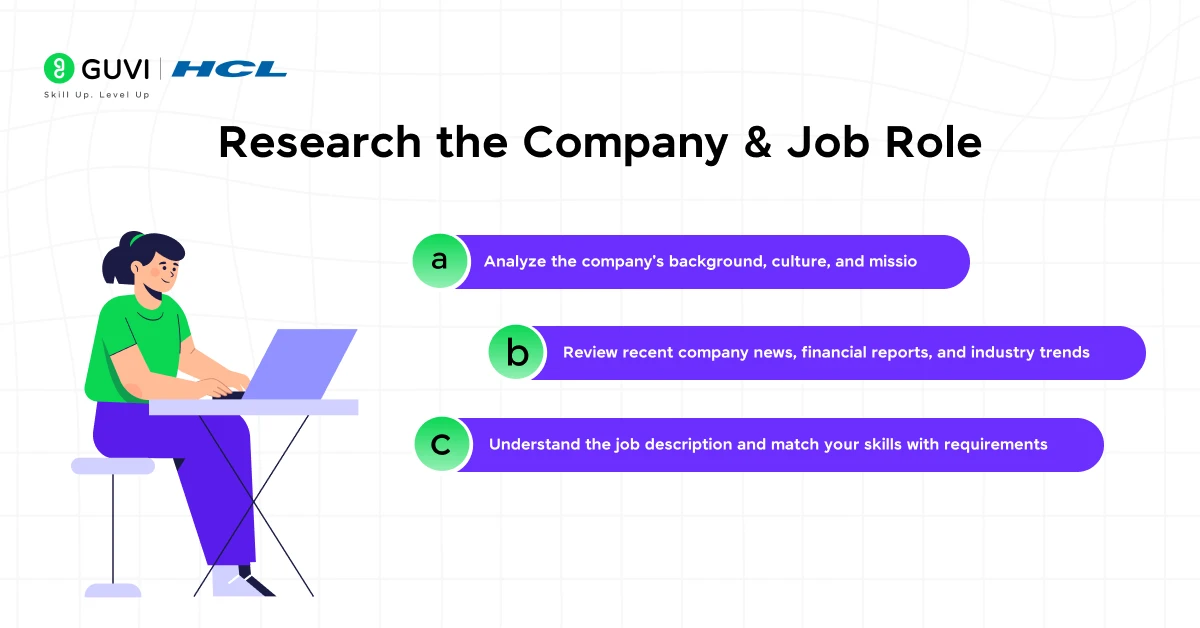
a) Analyze the company’s background, culture, and mission
The company’s website, especially the ‘About Us’ section, reveals vital information about their history, mission statement, and core values. Their social media platforms help you learn about their voice and how they connect with the community.
Look carefully at:
- Employee recognition programs and career advancement opportunities
- Community involvement and industry awards
- Recent celebrations of employee achievements
b) Review recent company news, financial reports, and industry trends
Publicly traded companies provide quarterly earnings calls and annual reports in their ‘Investor Relations’ section. These documents tell you about:
- New product launches and breakthroughs
- Business challenges and risks
- Revenue growth patterns
Startup profiles on venture capital databases show funding rounds, acquisitions, and recent hires. Industry-specific news sources also help you track:
- Market developments affecting the company
- Recent restructuring efforts
- Changes in leadership positions
c) Understand the job description and match your skills with requirements
A systematic breakdown of the job description helps arrange your qualifications perfectly:
- Create a detailed list of required skills, including both explicit and implicit requirements
- Note specific years of experience and educational qualifications
- Cross-reference your achievements with job requirements
- Use industry-specific terminology matching the job description
Pro tip: ATS systems screen most resumes today. Using exact phrases from the job description helps you pass these automated screenings.
Your career goals should guide what matters most about organizational culture. Think over aspects like:
- Management structure and decision-making processes
- Work-life balance initiatives
- Professional development opportunities
Keep in mind that 92% of executives believe better corporate culture increases firm value. Understanding and fitting into this culture shows your potential as a valuable team member.
Corporate blogs are great resources to track recent developments.
This research gives you the full picture needed to showcase your understanding during the interview. You’ll be ready to ask thoughtful questions and demonstrate genuine interest in joining their team.
2) Perfect Your Resume & Portfolio
Your resume and portfolio make your first impression in the job market. Over 80% of job listings require relevant professional work experience, so you must present your qualifications the right way.
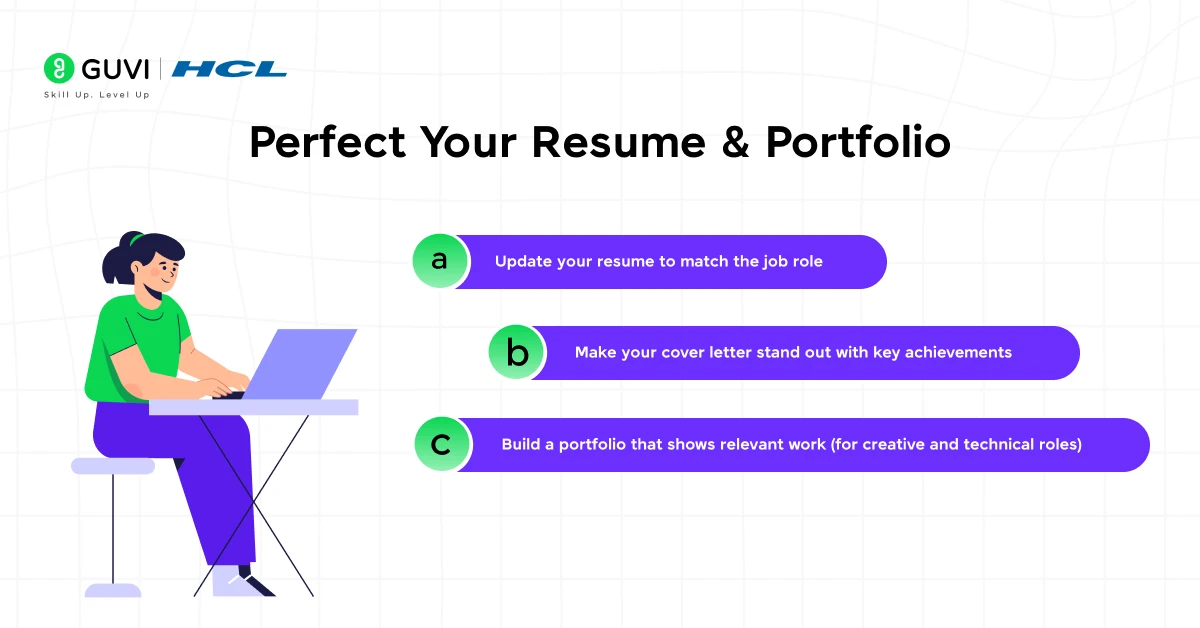
a) Update your resume to match the job role
You need to highlight experiences that match specific job requirements in your resume. Start with a “master resume” that contains all your experiences and achievements. Then customize it by:
- Adding relevant keywords from the job description naturally in your summary and achievements
- Showing quantifiable results that prove your impact
- Adjusting your skills section to focus on abilities mentioned in the posting
- Taking out or minimizing skills that don’t fit the role
Pro tip: Applicant Tracking Systems (ATS) scan resumes to find specific keywords. Your chances of passing initial screenings improve when you use the job posting’s language.
b) Make your cover letter stand out with key achievements
A cover letter is a chance to explain why you’re the ideal candidate. Studies show that applications with cover letters are 38% more likely to get noticed. Here’s how to write an effective cover letter:
- Open with your best achievement to grab attention
- Use the STAR method (Situation, Task, Action, Result) in body paragraphs
- Add specific details and metrics where you can
- Show your excitement about the role while staying professional
Note that you should explain any employment gaps in your cover letter, not your resume. Each cover letter must be unique and reflect the department’s specific requirements.
c) Build a portfolio that shows relevant work (for creative and technical roles)
A well-laid-out portfolio tells your story and helps hiring managers see how you’ll contribute. Make sure to include:
- Introduction and professional background summary
- Mission statement about your career objectives
- Work samples that show relevant skills
- Case studies proving your problem-solving abilities
- Process improvements you’ve made
- Awards and professional recommendations
Technical roles should also include:
- Code samples or GitHub repositories
- Project documentation
- System architecture designs
- Performance optimization results
Important: Your portfolio should be brief but engaging. Use clear headlines and focus on your biggest wins. Add visual elements like before-and-after screenshots to show your work’s impact.
Keep these documents updated and tailored to each opportunity.
This shows you’re a serious candidate who takes the interview process professionally. This preparation gives you an edge over other candidates and proves your enthusiasm for the position.
3) Prepare for Common & Behavioural Questions
Success in interviews requires smart preparation and practice. Research shows that 57% of employers ask candidates about their salary expectations. You must prepare complete responses.
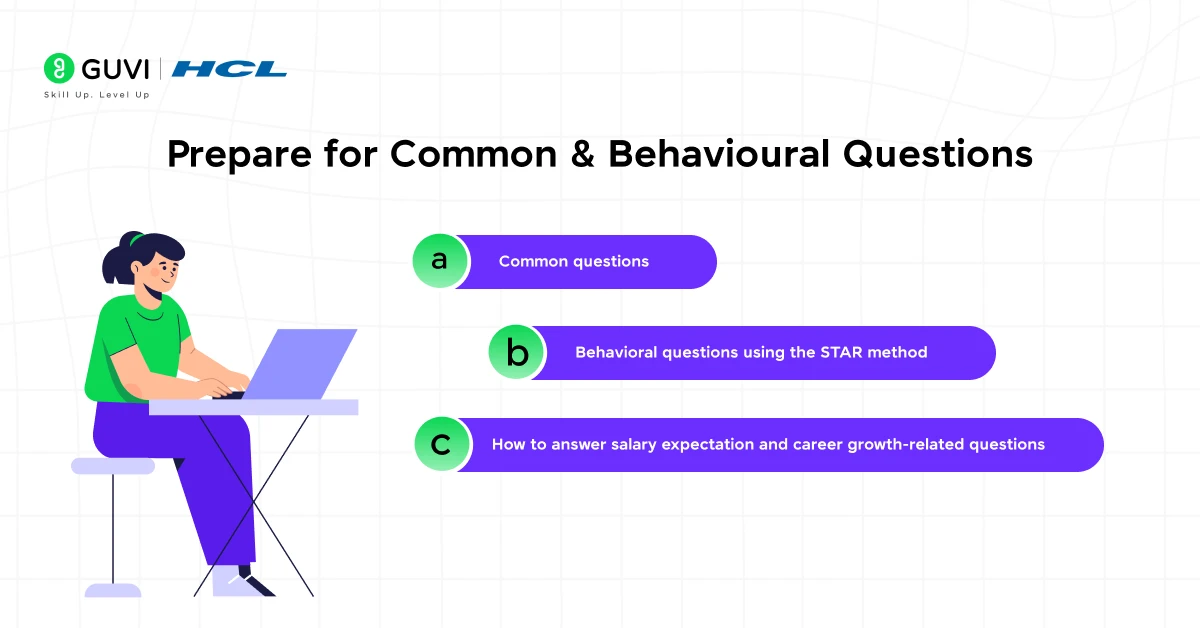
a) Common questions
Most interviewers start by asking about your background and what drives you. Your answers should be real and highlight your value rather than generic responses. To name just one example, questions about why you want to join need solid research and real enthusiasm for the role.
Essential tips for answering common questions:
- Link your goals to the company’s mission
- Give specific examples instead of vague statements
- Show clear understanding of your career path
- Skip phrases that only focus on personal gain
b) Behavioral questions using the STAR method
Your past actions help predict future performance in behavioral questions. The STAR method gives you a well-laid-out way to answer these questions:
- Situation (20%): Set the scene briefly
- Task (10%): Tell your responsibility
- Action (60%): Explain your specific steps
- Result (10%): Share what you achieved
You can excel in behavioral interviews by:
- Focusing on real behaviors and feelings
- Using “I” statements that show ownership
- Sharing specific examples tied to job needs
- Having 3-5 detailed stories ready
c) How to answer salary expectation and career growth-related questions
Salary talks need careful handling. Start with research from trusted sources like the U.S. Bureau of Labor Statistics. When asked about pay early on, try these approaches:
- Shift the focus: “I’d like to learn more about the position and team before discussing compensation. But may I ask what salary range you’re considering for this role?”
- Share a researched range: If they push for a number, give a range based on market data. Many companies now offer better pay to get top talent
Career growth questions should highlight:
- Your steadfast dedication to professional growth
- Desire to grow with the organization
- Skills you want to develop
- How your goals match company plans
Pro tip: Today’s competitive market values candidates who show both drive and realistic views about career growth.
Smart preparation for these questions positions you as a thoughtful candidate who knows their worth and fits the organization. Stay authentic in your responses while showing your value to the company.
4) Dress for Success
Your appearance can make or break a job interview. Hiring managers often make their decisions within minutes of meeting you. The right attire shows respect and proves you understand what’s expected in a professional setting.
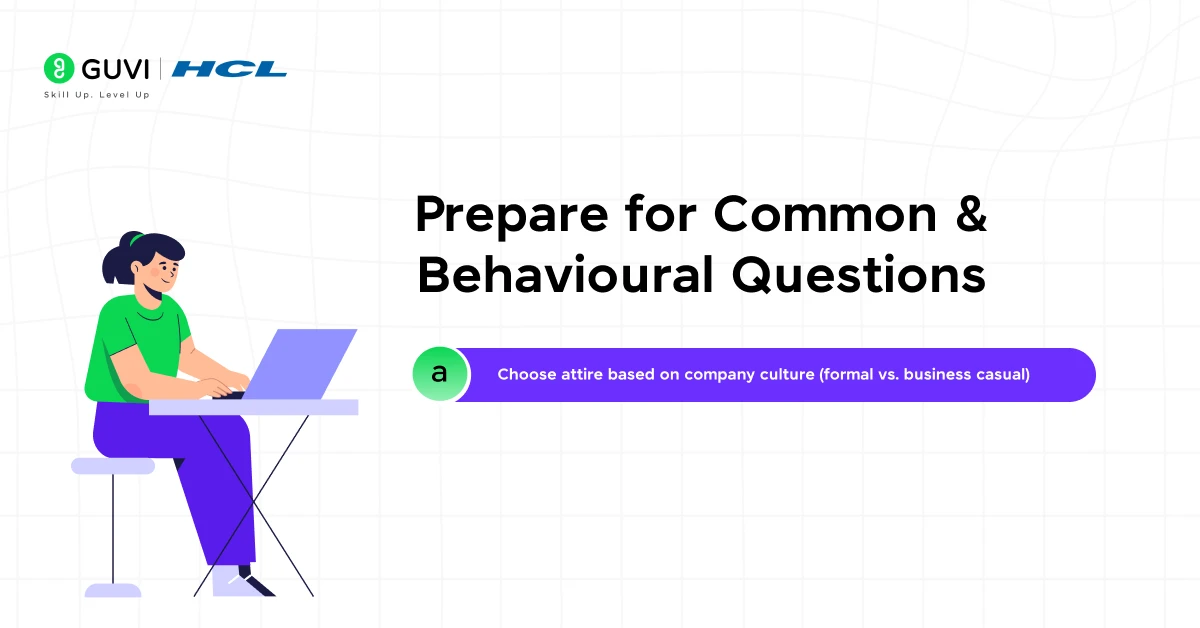
a) Choose attire based on company culture (formal vs. business casual)
The right impression starts with understanding the company’s dress code. Look at their website, social media, and employee photos to figure out what to wear.
Different industries have their own standards. A tech startup might welcome casual business wear, while banks expect formal attire. Without doubt, showing slightly overdressed beats being underdressed. So, do keep these pointers in mind.
Remote interviews need the same attention to detail. Pick solid colors that look good on camera, set up proper lighting, and stay just as well-groomed. These small details show your steadfast dedication and respect for this chance.
5) Body Language & Communication Skills
Job interviews require more than just the right words. Psychology Today recognizes eye contact as the strongest form of non-verbal communication. You need to become skilled at both verbal and non-verbal cues to succeed in interviews.
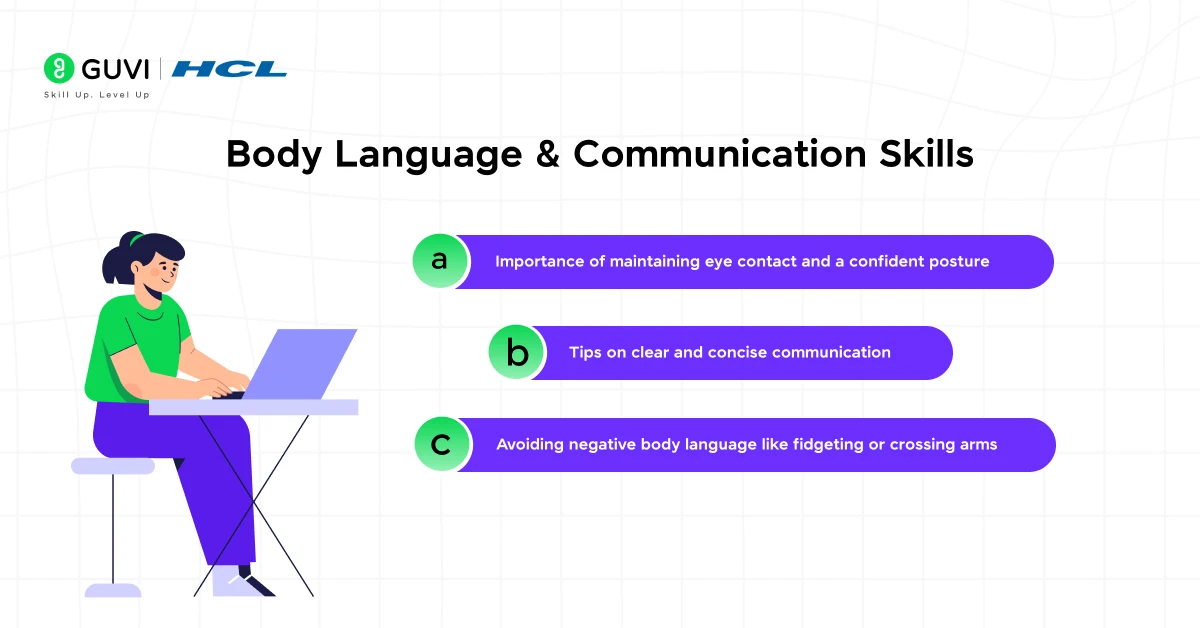
a) Importance of maintaining eye contact and a confident posture
Good eye contact builds trust and creates rapport with interviewers. Studies show that two to four seconds of eye contact works best – shorter durations might go unnoticed while longer ones could make interviewers uncomfortable. During panel interviews, look at the person asking the question first, then involve others with occasional eye contact.
Your posture is just as important in showing confidence. Sitting upright shows a positive attitude and interest. All the same, don’t appear too stiff – it might make you seem uncomfortable or unfriendly. Leaning slightly forward shows you’re interested without getting too close to the interviewer’s space.
b) Tips on clear and concise communication
Clear communication reveals your emotional intelligence and adaptability. Here are some proven techniques:
- Be direct and straightforward in your responses
- Show active listening through appropriate expressions and affirmations
- Mirror some responses to build rapport naturally
- Use clear language, avoiding industry jargon unless it’s relevant
c) Avoiding negative body language like fidgeting or crossing arms
Bad body language can hurt your chances of success through unconscious habits. Research shows these behaviors create bad impressions:
Actions to Avoid:
- Checking time during the interview
- Touching your face (people think you’re hiding something)
- Looking sluggish or disinterested
- Making poor eye contact or looking around
- Crossing arms (makes you look defensive)
Virtual interviews need these same principles with some extra care. Look directly at the camera to create eye contact. Position yourself well to keep good posture throughout the talk.
Note that your body language speaks volumes during an interview.
Managing these non-verbal cues creates a positive impression that lines up with what you’re saying. Clear speech, confident body language, and real engagement with the interviewer’s questions are the foundations of effective communication.
6) Technical & Skill-Based Preparation
Technical skills are the foundations of many job roles. You must prepare well to succeed in interviews. A well-laid-out approach to technical preparation will help you stand out from other candidates.
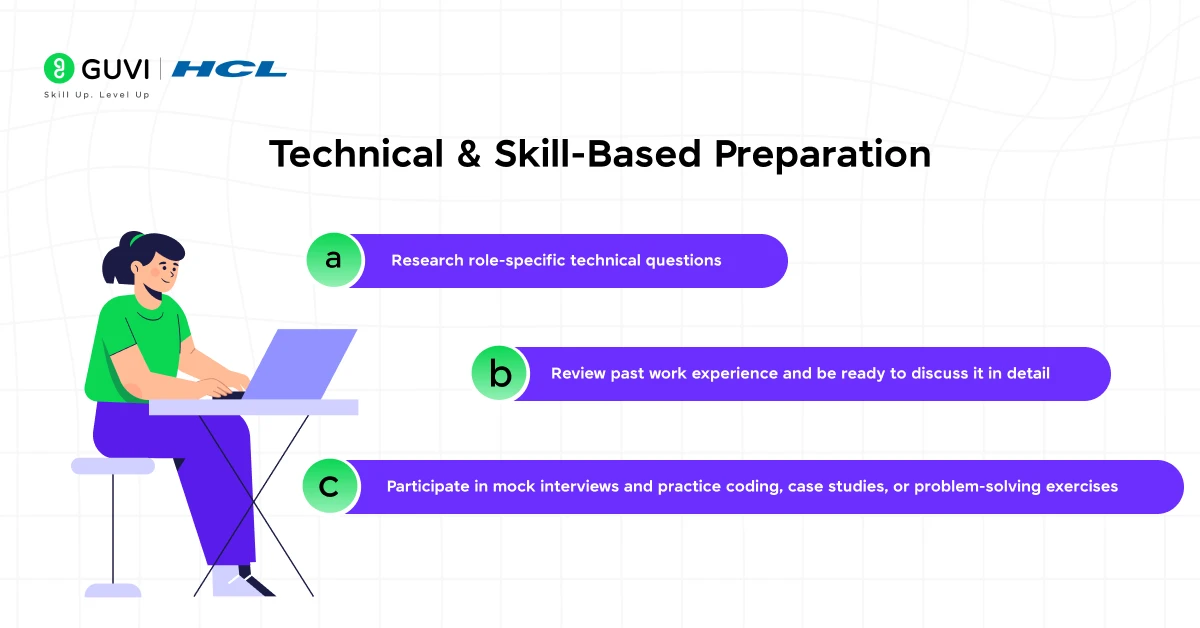
a) Research role-specific technical questions
You just need a systematic strategy to prepare for specific roles. Software engineering positions require focus on coding challenges and system design questions. Data shows successful candidates usually practice:
- Data structure implementations
- Algorithm optimization techniques
- System architecture concepts
- Performance improvement strategies
Pro tip: Build a detailed study plan starting with basic concepts. Move gradually to advanced topics. The questions that test your problem-solving abilities and analytical thinking deserve extra attention.
b) Review past work experience and be ready to discuss it in detail
Your past experiences provide solid examples of what you can do. Numbers and metrics make your responses more powerful. Here’s what to cover from previous roles:
- Document specific projects with measurable outcomes
- Prepare detailed examples of problem-solving scenarios
- Highlight team achievements
- Outline technical challenges overcome
c) Participate in mock interviews and practice coding, case studies, or problem-solving exercises
Mock interviews act as rehearsals for actual technical assessments. Studies show candidates perform better and feel more confident after practice sessions. Good preparation includes:
Technical Practice Sessions
- Regular mock interviews with industry professionals
- Recording sessions to evaluate yourself
- Getting detailed feedback on technical knowledge and communication
- Learning to explain complex concepts clearly
Coding roles benefit from platforms that offer anonymous practice interviews with experienced engineers. These sessions provide:
- Direct feedback on coding style
- Learning about industry best practices
- Better problem-solving approaches
- Clear communication of technical concepts
Note that interviewers look at both your technical knowledge and your ability to explain complex ideas. They also evaluate how well you cooperate with others.
7) Questions to Ask the Interviewer
Thoughtful questions at the end of your interview show real interest and help you stand out from other candidates. Studies show that candidates who ask well-researched questions are 38% more likely to receive job offers.
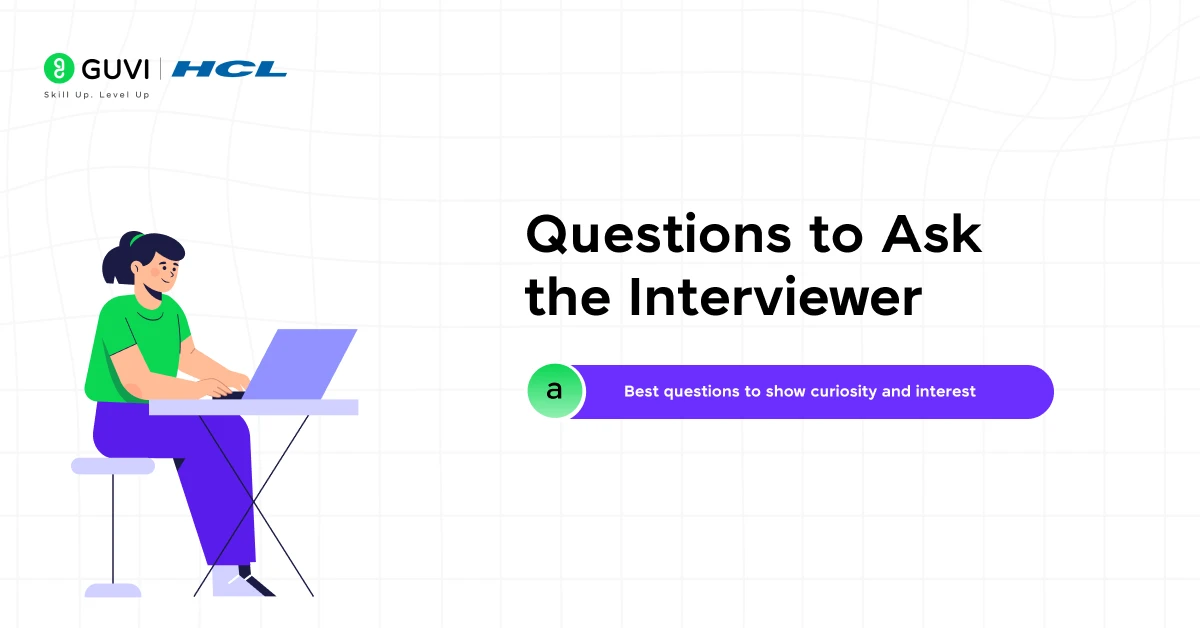
a) Best questions to show curiosity and interest
Smart questions serve two purposes: you learn valuable information about the role and showcase your professional insight. Research shows employers expect candidates to bring 3-4 prepared questions. Here are key areas to shape your questions:
Company Growth and Development: Questions about the organization’s future show your long-term interest. Focus on:
- Strategic initiatives and market expansion
- Professional development paths
- Team growth projections
- State-of-the-art technology plans
Role-Specific Questions: A solid grasp of your potential position helps assess fit and shows initiative. Ask about:
- Daily responsibilities
- Success metrics
- Current challenges
- Team dynamics
Examples:
The largest longitudinal study reveals these questions consistently impress interviewers:
- Performance and Success Metrics: “How will you measure the success of the person in this position?” This question shows your results-driven mindset and drive to excel.
- Team Dynamics: “Can you tell me more about the team I would be working with?” Learning about team structure helps you understand culture fit and relationships.
- Professional Growth: “What opportunities exist for training and progression within the organization?” This shows your steadfast dedication without focusing only on personal gain.
- Company Culture: “How would you describe the working culture of the organization?” Such questions reveal genuine interest in workplace dynamics and values.
- Leadership View: “What gets you most excited about the company’s future?” This personal question builds rapport while teaching you about company direction.
- Role Development: “What are you hoping this person will accomplish in their first six months?”
This shows proactive thinking and your desire to understand expectations.
8) Post-Interview Follow-Up
Your actions right after the interview can make or break your chances of landing the job. Hiring managers watch your post-interview communication closely, and your follow-up approach is vital to success.
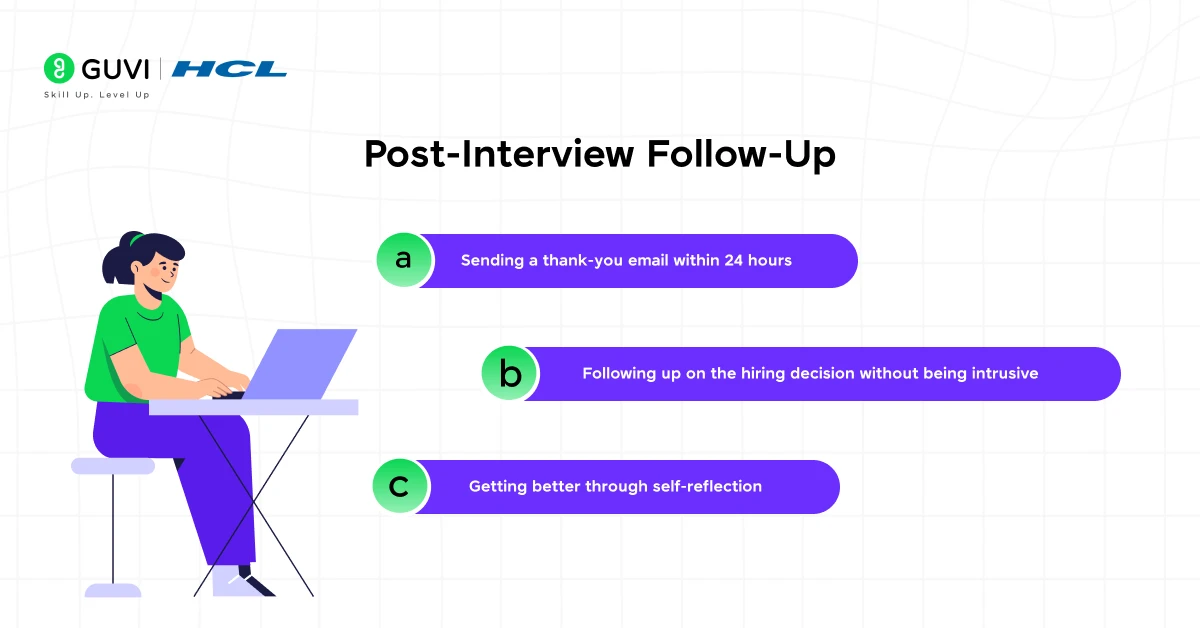
a) Sending a thank-you email within 24 hours
A thoughtful thank-you email helps you stand out from other candidates. You should send your note within 24 to 48 hours after meeting. The best time to send Friday interview follow-ups is Monday morning. This prevents your message from getting lost in weekend emails.
Key elements of an effective thank-you email:
- Express genuine appreciation for the interviewer’s time
- Reference specific conversation points to make the message personal
- Keep the tone professional yet warm
- Include any additional information requested during the interview
Pro tip: Each interviewer deserves a personal note, even after panel interviews. This level of detail shows respect and thoroughness to everyone involved in hiring you.
b) Following up on the hiring decision without being intrusive
Patience matters after sending your thank-you note. Send a brief, professional reminder if you don’t hear back within a week. Stay enthusiastic but avoid sounding desperate or pushy. Complex hiring processes with multiple interview rounds need adjusted follow-up timelines.
c) Getting better through self-reflection
Self-evaluation right after your interview helps sharpen your skills. Look at these key areas:
Content Analysis:
- Write down all questions asked and your responses
- Note your strongest answers
- Spot topics you need to prepare better
- List points you should have emphasized more
Performance Review:
- Rate how clearly you communicated
- Look at your body language effectiveness
- Think about your connection with interviewers
- Review your professional presentation
This analysis makes future interviews stronger. Practice better responses to questions that challenge you. Your verbal and non-verbal communication skills grow naturally through consistent self-review.
Each interview gives you valuable lessons to learn from. Keeping detailed records of your interview experiences creates a roadmap that helps you improve your job search experience.
Concluding Thoughts…
As we can see from the discussion above, success in job interviews needs good preparation in several areas. These eight practical steps will help you stand out from other candidates with solid research, professional presentation, and clear communication.
Note that interviews give you a chance to learn and grow. Your preparation shapes how others see you long after those quick first impressions. The key is to start early, practice often, and refine your approach based on feedback. And always remember, you can do it!
Top candidates typically invest 10-15 hours to prepare for big interviews. This time commitment may seem long, but it builds your confidence and helps you perform better when it matters most. Take these steps to heart, adjust them for your needs, and use each interview to show your true value.
FAQs
Arrive 10-15 minutes early, dress professionally according to the company culture, maintain positive body language, and greet the interviewer with a firm handshake and smile. Remember, your interview starts the moment you enter the building.
Research common questions for your industry and practice your responses using the STAR method (Situation, Task, Action, Result). Focus on crafting concise, relevant answers that highlight your skills and experiences. Consider conducting mock interviews with friends or family to gain confidence.
Research industry standards for the role and provide a salary range based on your experience and skills. If asked early in the process, you can politely redirect the conversation by expressing interest in learning more about the position before discussing compensation.
Prepare 3-4 thoughtful questions that demonstrate your interest in the role and company. Ask about team dynamics, growth opportunities, or current challenges the department is facing. Avoid questions about basic information readily available on the company website.
Very important. Send a personalized thank-you email within 24-48 hours of the interview. Reference specific conversation points to show your engagement and reiterate your interest in the position. This helps you stand out and leaves a positive final impression.





















![Top 40 Java Full Stack Developer Interview Questions and Answers [2025] 11 java full stack developer interview questions](https://www.guvi.in/blog/wp-content/uploads/2025/06/Top-40-Java-Full-Stack-Developer-Interview-Questions-and-Answers.png)

![Top 40 Data Science Interview Questions for Freshers [2025] 13 data science interview questions for freshers](https://www.guvi.in/blog/wp-content/uploads/2025/06/Top-40-Data-Science-Interview-Questions-for-Freshers-2025.png)


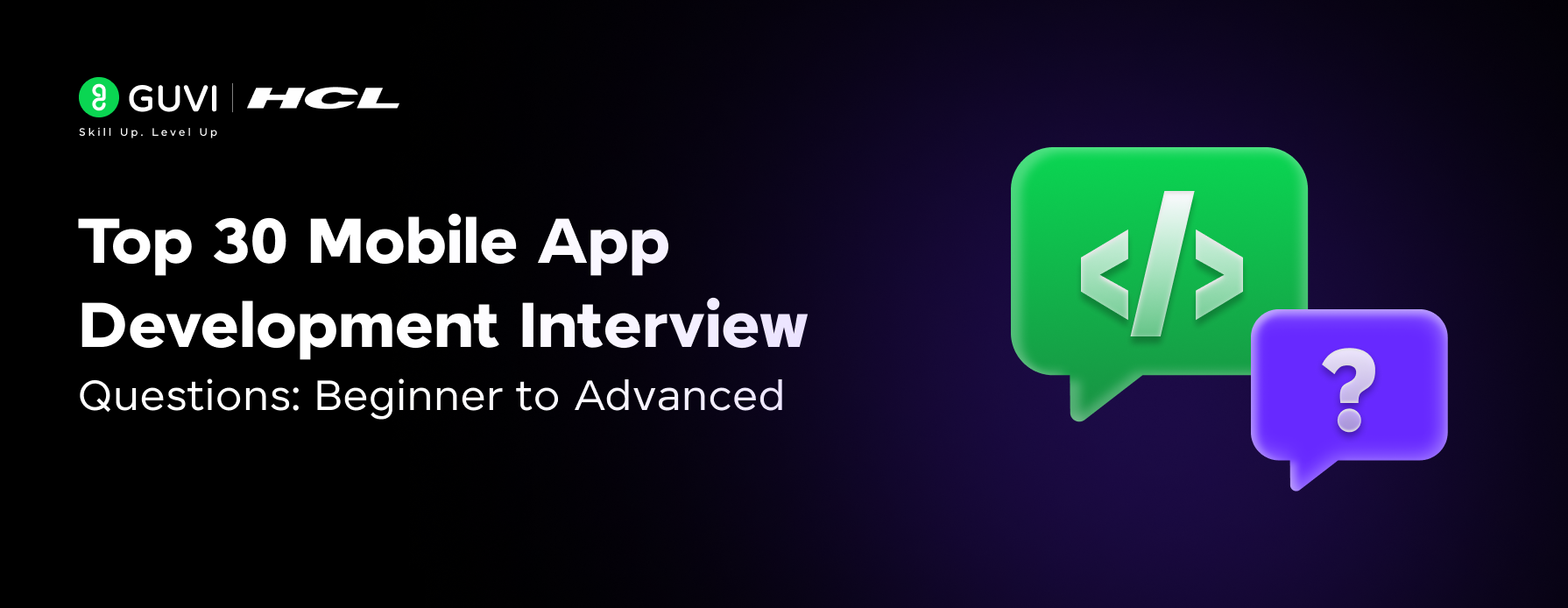
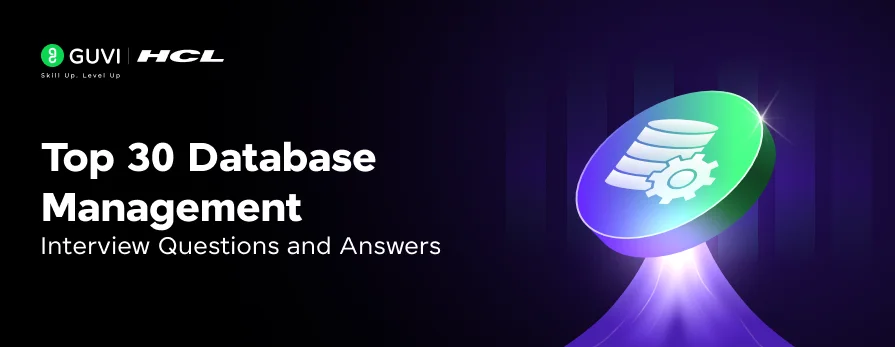
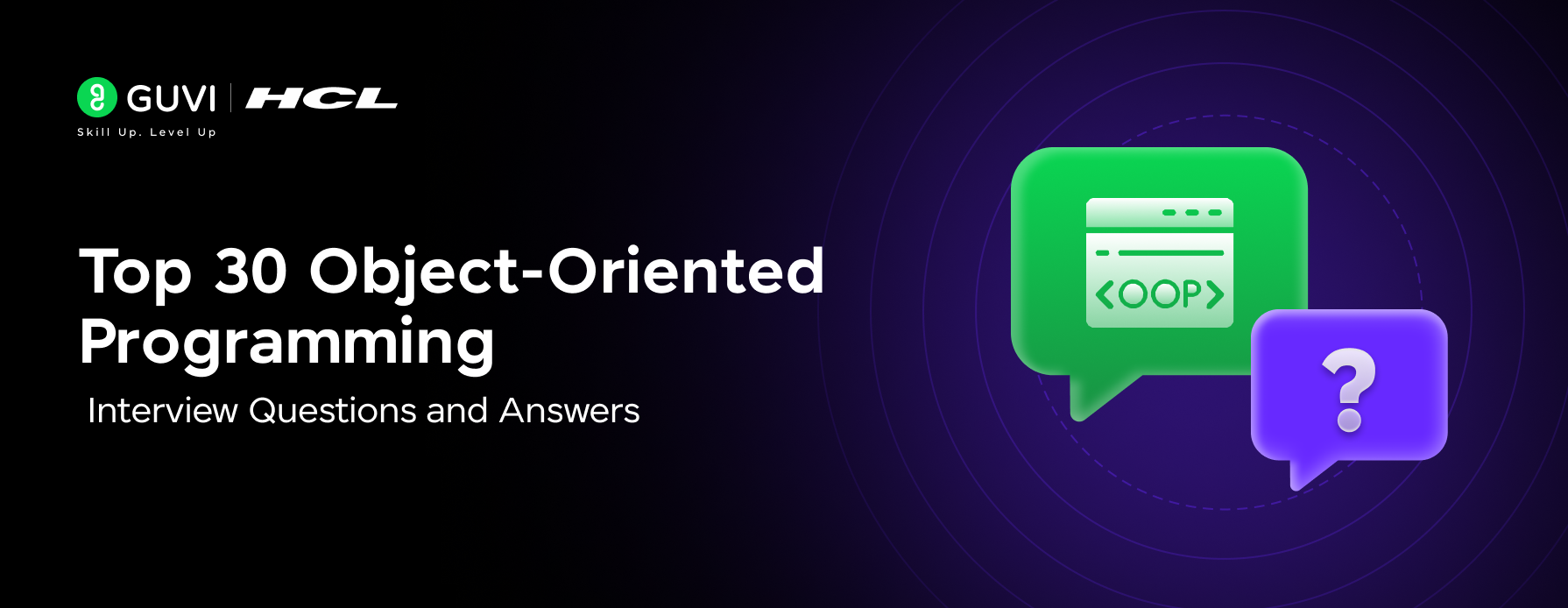
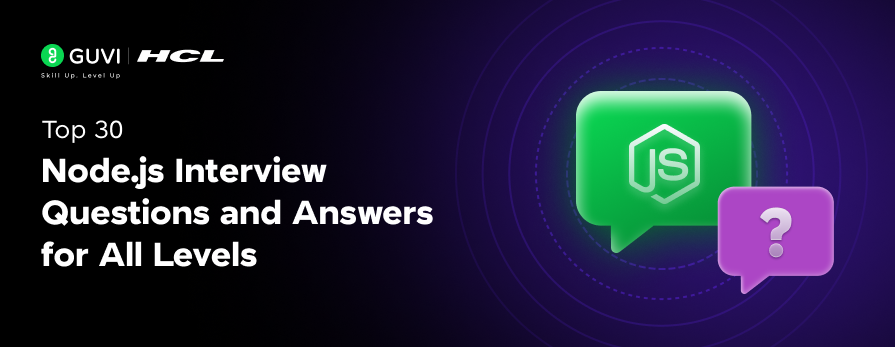

Did you enjoy this article?